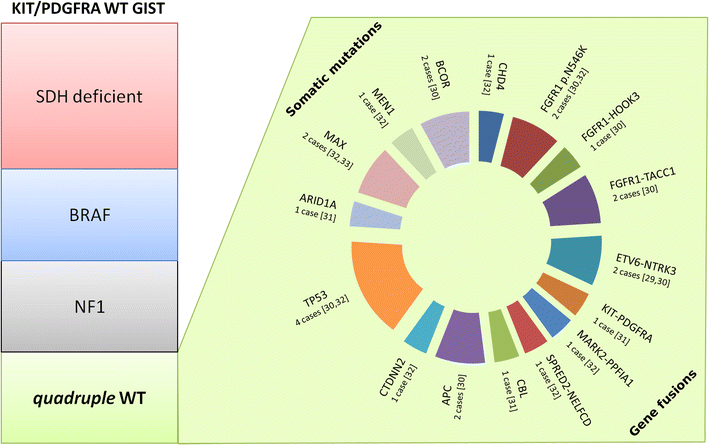The progressive fragmentation of the KIT/PDGFRA wild-type (WT) gastrointestinal stromal tumors (GIST)
- PMID: 28535771
- PMCID: PMC5442859
- DOI: 10.1186/s12967-017-1212-x
The progressive fragmentation of the KIT/PDGFRA wild-type (WT) gastrointestinal stromal tumors (GIST)
Erratum in
-
Erratum to: The progressive fragmentation of the KIT/PDGFRA wild-type (WT) gastrointestinal stromal tumors (GIST).J Transl Med. 2017 Jun 2;15(1):125. doi: 10.1186/s12967-017-1228-2. J Transl Med. 2017. PMID: 28577566 Free PMC article. No abstract available.
Abstract
Recent advances in molecular biology have revolutionized the concept of KIT/PDGFRA wild type (WT) gastrointestinal stromal tumors (GIST) than the past. Indeed, from being defined as GIST without KIT or PDGFRA mutations, we are now faced with the opposite scenario, where KIT/PDGFRA WT GIST are "positively" defined according to their specific molecular alterations. In particular, if until recently KIT/PDGFRA GIST without abnormalities of KIT, PDGFRA, SDH, and the RAS signaling pathway were referred as quadruple WT GIST, today also this small subset of GIST is emerging out as a group of heterogeneous distinct entities with multiple different molecular alterations. Therefore, given this still growing and rapidly evolving scenario, the progressive molecular fragmentation may inevitably lead over the time to the disappearance of KIT/PDGFRA WT GIST, destined to be singularly defined by their molecular fingerprint.
Keywords: ETV6–NTRK3; FGFR1; GIST; MAX; MEN1; Quadruple wild-type; SDH.
References
-
- Gill AJ, Chou A, Vilain R, Clarkson A, Lui M, Jin R, Tobias V, Samra J, Goldstein D, Smith C, Sioson L, Parker N, Smith RC, Sywak M, Sidhu SB, Wyatt JM, Robinson BG, Eckstein RP, Benn DE, Clifton-Bligh RJ. Immunohistochemistry for SDHB divides gastrointestinal stromal tumors (GISTs) into 2 distinct types. Am J Surg Pathol. 2010;34:636–644. - PubMed
-
- Janeway KA, Kim SY, Lodish M, Nosé V, Rustin P, Gaal J, Dahia PL, Liegl B, Ball ER, Raygada M, Lai AH, Kelly L, Hornick JL, NIH Pediatric and Wild-Type GIST Clinic. O’Sullivan M, de Krijger RR, Dinjens WN, Demetri GD, Antonescu CR, Fletcher JA, Helman L, Stratakis CA. Defects in succinate dehydrogenase in gastrointestinal stromal tumors lacking KIT and PDGFRA mutations. Proc Natl Acad Sci USA. 2011;108:314–318. doi: 10.1073/pnas.1009199108. - DOI - PMC - PubMed
-
- Miettinen M, Wang ZF, Sarlomo-Rikala M, Osuch C, Rutkowski P, Lasota J. Succinate dehydrogenase-deficient GISTs: a clinicopathologic, immunohistochemical, and molecular genetic study of 66 gastric GISTs with predilection to young age. Am J Surg Pathol. 2011;35:1712–1721. doi: 10.1097/PAS.0b013e3182260752. - DOI - PMC - PubMed
MeSH terms
Substances
LinkOut - more resources
Full Text Sources
Other Literature Sources
Miscellaneous


